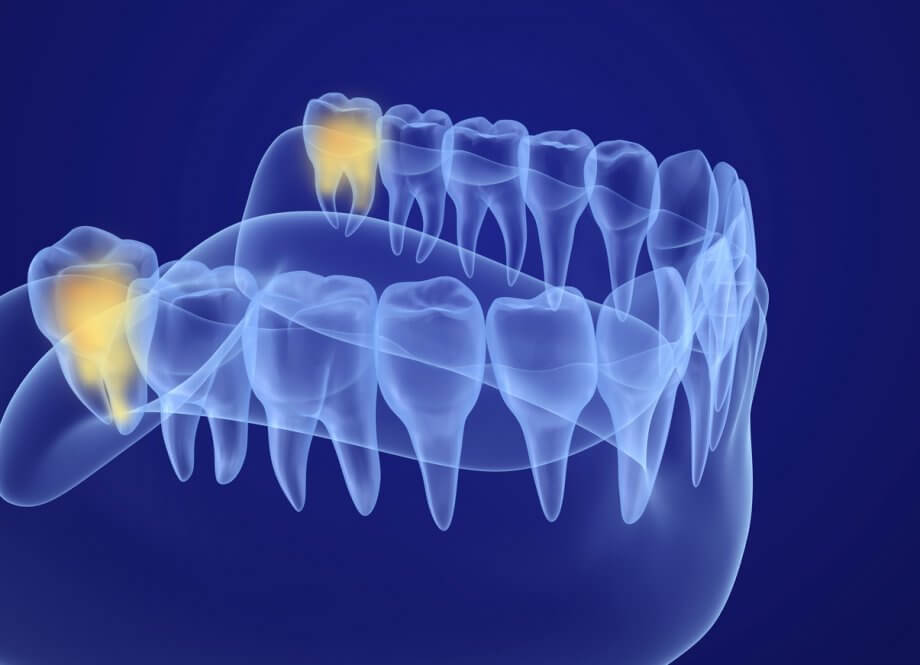One of the most common procedures we perform as oral surgeons is wisdom tooth extraction. Why is that? Well, it’s simple: everyone gets wisdom teeth and almost everyone needs to get them pulled out. Here are some common questions our patients have about their wisdom teeth.
1. What are wisdom teeth?
The very last set of molars we get is our wisdom teeth. The third set of molars in our mouths, they emerge on both sides of the upper and lower jaw. You might wonder why we get these extraneous teeth that just need to be pulled out; evolutionary biologists believe that primitive humans wore out their molars in early adulthood and wisdom teeth were meant to replace them. Even though our diets and oral hygiene habits have changed significantly since then, wisdom teeth still form in our jaws around the age of 7.
2. When do wisdom teeth usually come in?
Wisdom teeth form in early childhood and then they stay in our jaws about a decade before they start to emerge, usually in our late teens or early twenties. Of course, everyone is different, so they may erupt earlier or later––or they may be impacted, which means they don’t emerge at all. More on that below.
3. Do I really need to get my wisdom teeth out?
Unfortunately, most people do need to get their wisdom teeth out. There’s just not room for them. If you’re one of the lucky few whose wisdom teeth erupt without presenting any problems, their location at the back of the mouth makes them prone to cavities and gum disease because they’re hard to reach while brushing and flossing.
Wisdom teeth often come in at an angle, which can cause misalignment and crowding in other teeth, along with cysts and bite problems. They can also be fully or partially impacted, meaning all or part of the tooth is trapped in the gums or jawbone. This causes painful headaches, soreness, and jaw problems. A partially impacted wisdom tooth is also an infection risk.
4. What happens during wisdom tooth extraction?
Wisdom teeth that have fully emerged only need a simple extraction; this involves using a special instrument called an elevator to gently loosen the tooth from the socket and forceps to remove it.
Impacted and partially impacted wisdom teeth are a bit more complicated. These cases require a surgical procedure in which a small incision is made to extract the tooth. Occasionally, bone may need to be removed as well.
5. Will I have anesthesia when you take out my wisdom teeth?
Of course! We give all patients anesthesia for wisdom tooth extraction. This could be either local anesthesia injected into the area where we’re working or, in certain circumstances, general anesthesia which allows you to sleep through the procedure and wake up with no memory of it.
We also have sedation options that fall between local anesthesia and general anesthesia in terms of your awareness of the procedure. These include inhaled sedation, oral sedation, and IV sedation.
6. What is the recovery like?
Your recovery depends on the complexity of your surgery. Simple extractions usually have an easier recovery than surgical extractions.
Headaches, swelling, bleeding, and soreness are all common in the days after your procedure, but they typically only last for a week or two at the most. Use cold compresses to bring down swelling along with over-the-counter anti-inflammatory pain medication. Warm saltwater rinses can soothe discomfort as well.
7. Are there complications of wisdom tooth extraction?
As with any surgical procedure, there’s a risk of infection and damage to nerves and surrounding structures. The most common complication is dry socket, which occurs when a clot either doesn’t form in the wisdom tooth socket or when it forms but is later dislodged. Dry sockets are painful and emit a foul odor; if you suspect you have a dry socket, call us immediately.
8. How much does wisdom tooth extraction cost?
The cost depends on the complexity of your case. Surgical extraction costs more than simple extraction. We will give you an estimate before your procedure.
9. Will my insurance cover wisdom tooth removal?
Wisdom tooth extraction is usually covered by dental insurance and sometimes also health insurance. We will coordinate with your insurance providers and tell you how much they will cover when we provide you with your estimate.
10. How can I find out more about wisdom tooth removal?
Sometimes the best way to calm your nerves before a procedure is to sit down and chat. We’re happy to discuss any concerns or questions you might have. Contact us at 505-821-2111 to schedule an appointment.

